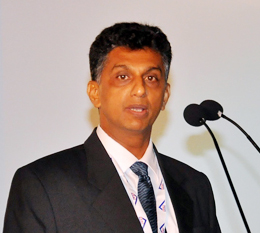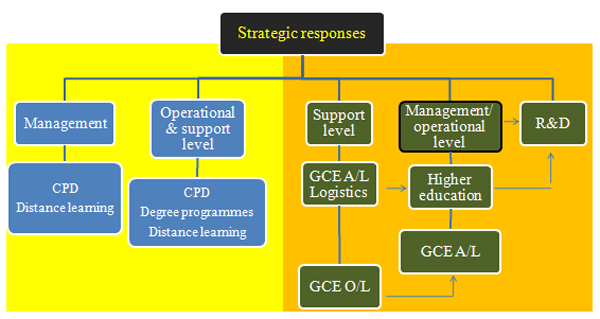CINEC gears to Sri Lanka’s rising need of capacity building
View(s):
Professor (Capt) Nalaka Jayakody
The rising demand for Professionals in many industries especially in the Logistics Industry is pretty obvious given the countries vision to become the “Wonder of Asia.” Professor (Capt) Nalaka Jayakody made it very clear that CINEC Maritime Campus- one of the largest Private Educational Institute in Sri Lanka is on the right track to produce human capital in the field of Maritime, Logistics, Freight Forwarding, and Transport. He revealed this at the 2nd International Sri Lanka Ports, Trade & Logistics Conference & Exhibition which was held during May 1st- 3rd 2013 at The Hilton Hotel, Colombo, Sri Lanka with the theme of “Accelerating Development, Promoting Commercial Opportunities in South Asia’s Emerging Maritime Hub”.
Sri Lanka’s Maritime and logistics industry in the past mainly consisted of traditional imports and exports such as Tea, Rubber, Coconut, and spices. Market players had their own limitations such as lack of international exposure, lesser number of sectors which are commercially viable to capitalize on, lack of investments, less competition thus fewer innovations. As far as the workforce was concerned it had been traditionally resorted to top and middle level managers; error rate of output was high; and the domain knowledge was considered less important; and on the job training was the main mechanism in order to train the employees.
Deviating from traditional Exports and Imports the present market outlook is richly associated with very lucrative and demanding market segments such as Garments; Transshipment Cargo; Gas and Petroleum Oil for national needs; Ship/air craft surveys and Repairs; Bunkering & re-fuelling; Logistics Training; and Tourism among many others.
In contrast present Market Players have diversified interests; Large investments and some of them being major multinational players. Present workforce consists of some Top and Middle level managers from the old regime. There is a limited number of the new regime of managers with an academic background in the respective field. In addition there are professionals such as Pilots, Surveyors etc. who are presently engaged in the field.
Present Market Outlook
 In the journey to becoming the wonder of Asia, Mattala Rajapaksa International Airport ; Colombo South Harbour ;Magam Ruhunupura Mahinda Rajapaksa Port ; Increased imports due to infrastructure development & maintenance projects; More Thermal power plants connected with sea routes; Oil Exploration; Ship Registrations; Bunkering & re-fuelling; Development of new fisheries harbours ; Expansion of fishing industry; Colombo as a Maritime arbitration centre; Possible MRCC; Tourism; Services to ships & air crafts; Sea Marshalls facilitation etc… could be identified as important milestones.
In the journey to becoming the wonder of Asia, Mattala Rajapaksa International Airport ; Colombo South Harbour ;Magam Ruhunupura Mahinda Rajapaksa Port ; Increased imports due to infrastructure development & maintenance projects; More Thermal power plants connected with sea routes; Oil Exploration; Ship Registrations; Bunkering & re-fuelling; Development of new fisheries harbours ; Expansion of fishing industry; Colombo as a Maritime arbitration centre; Possible MRCC; Tourism; Services to ships & air crafts; Sea Marshalls facilitation etc… could be identified as important milestones.
The quality of the sector further improved through competition after shipping sector liberalized in 1990.Today Colombo port ranks amongst the Top 30 worlds busiest ports which will enable new 18,000 TEUs Triple-E containerships.
SL shows steady improvement in the Global Competitiveness Report (World Economic Forum- WEF) and Connecting to Compete Report (The World Bank) in various logistics related indicators particularly the post war scenario. With regard to Connecting to Compete ranking SL has improved from 137 to 81 in “Logistics Performance Indicator”, while 138 to 89 and 142 to 68 with respect to Infrastructure and Logistics quality and Competence respectively. Professor Jayakody’s presentation mainly targeted the latter indicator as the training and development has a direct impact on the competence and the quality of logistics. Further he mentioned that given the geographical and strategic advantages SL should consider to occupy a place within the top ten countries within five years.
The conference in its overview and objectives had appreciated the knowledge platform to gain the commercial edge and gain access to Sri Lanka’s huge maritime & logistics base. It also identified that SL is well placed to continue the momentum to become an integral part of South Asia’s drive and to assume its position as one of the most important economic areas in the entire world.
This scenario demands following under short, medium and long term strategies
-Enhance domain knowledge of present workforce through professional education and training
-Encourage more seafarers who could see the bigger picture acquire senior positions in the logistics chain having gained professional/academic qualifications that are required to manage a firm.
-Make professional qualification in Logistics and Transport a mandatory requirement for employment in shipping related industries as a long term strategy.
-Introduce Logistics and Transport education in the government education system as an optional subject.
There will be many opportunities existing in local firms such as Shipping Lines (Principals & Agents) offices, Ports and Governments, Transport and Logistics firms, Exporting, Importing, Trading & Manufacturing firms, Educational Institutes , Oil & Gas industry, R & D or consultancy firms. This is an advantage from the community perspective for those who wish to follow professional courses. On the other hand there are other benefits of Professional Education to the country as a whole such as
-Improve the operational efficiency
-Reduce errors thus reduce costs
-Enhance the business potential
-Effective decision making by staff through widening the domain knowledge
-Increase the impact of “Experience curve advantage”
-Creates a competitive advantage to the firm
It was pointed out regarding the shift in the maritime industry taking place from west to East, with Sri Lanka emerging as the Indian Ocean’s new maritime hub. It is therefore vital to develop appropriate strategies to face the future challenges.
The Government of Sri Lanka is rapidly positioning itself as a dynamic part of a ‘Southern Maritime zone after the rise of Singapore and Dubai’ as the conference stressed in its objectives and Professor Jayakody in his speech stressed that in order to cater to the rising demand of competent, qualified, and knowledgeable work force to achieve such objectives given the global competition.
CINEC is comprehensively armed with experienced resource panel and infrastructure for technical training including world class simulators and infrastructure.
CINEC Campus offers courses in different academic stages ranging from PhD – MSc- MBA -BEng – BSc- Diploma – to Certificate level in Maritime, Transport, Logistics, Engineering, Architecture, Tourism, Sport, Shipping, Law , Customs , Aviation, Oil exploration and many more vital subjects.
Follow @timesonlinelk
comments powered by Disqus


